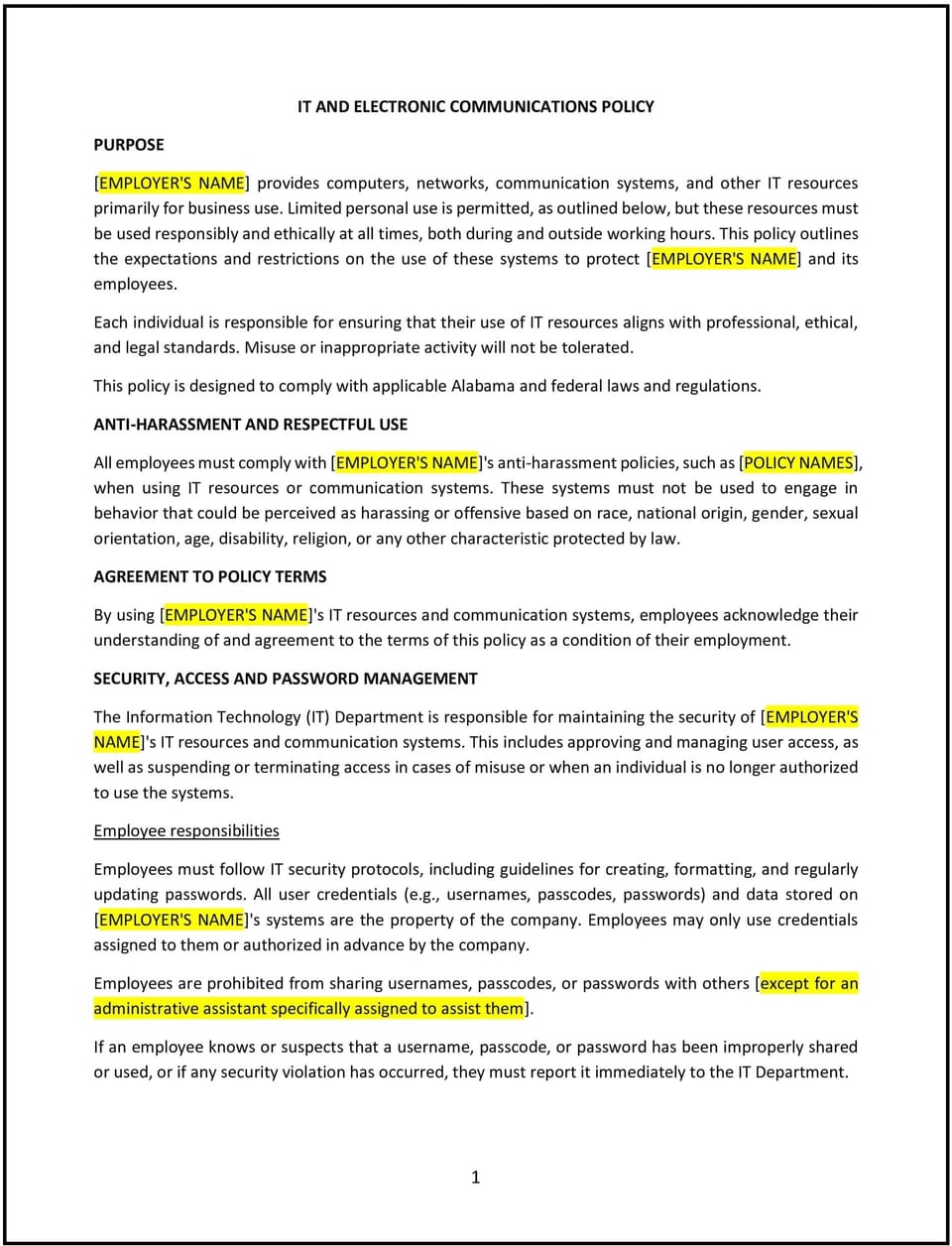IT and electronics communications policy (Alabama): Free template

IT and electronics communications policy (Alabama)
An IT and electronics communications policy outlines the acceptable use of company-provided technology, including computers, mobile devices, email, and internet access. For SMBs in Alabama, this policy establishes clear expectations to ensure secure, professional, and efficient use of electronic resources while protecting sensitive information and minimizing risks.
This policy provides employees with guidelines for proper conduct when using technology for business purposes, fostering accountability and safeguarding the organization’s digital infrastructure.
How to use this IT and electronics communications policy (Alabama)
- Define acceptable use: Specify appropriate activities for company-provided devices and systems, such as work-related tasks, professional communications, and approved software usage.
- Prohibit unauthorized activities: Outline prohibited actions, such as accessing inappropriate websites, downloading unauthorized software, or using devices for personal gain.
- Address data security: Include requirements for creating strong passwords, reporting security incidents, and avoiding the use of unsecured networks for business purposes.
- Establish monitoring practices: Inform employees of the company’s right to monitor usage of IT resources to ensure compliance with the policy.
- Set guidelines for electronic communications: Provide expectations for email, messaging, and other digital communications, emphasizing professionalism and confidentiality.
Benefits of using an IT and electronics communications policy (Alabama)
A robust IT and electronics communications policy benefits both employees and the organization by promoting responsible technology use. Here’s how it helps:
- Protects company data: Reduces risks of breaches or data loss by setting clear security guidelines for technology use.
- Ensures compliance: Aligns with Alabama and federal regulations regarding data privacy and electronic communications.
- Enhances productivity: Limits distractions by discouraging misuse of IT resources for non-work activities.
- Promotes professionalism: Establishes standards for digital communication, protecting the company’s reputation and fostering respect in the workplace.
- Minimizes liability: Reduces the risk of legal or operational issues stemming from inappropriate use of technology.
Tips for implementing an IT and electronics communications policy (Alabama)
- Educate employees: Provide training on cybersecurity best practices, such as recognizing phishing attempts and securing devices.
- Update systems regularly: Ensure company devices and software are updated with the latest security patches and features.
- Limit access: Implement role-based access controls to restrict sensitive data and applications to authorized personnel only.
- Use monitoring tools responsibly: Employ tools to track usage of IT resources while respecting employee privacy and complying with legal standards.
- Review the policy periodically: Regularly assess the policy’s effectiveness and make updates to address evolving technological or operational needs.
Q: What activities are considered inappropriate use of IT resources?
A: Inappropriate use includes accessing non-work-related websites, downloading unauthorized applications, sharing sensitive data without approval, and engaging in illegal activities.
Q: Are employees allowed to use company devices for personal purposes?
A: Limited personal use may be allowed, but it must not interfere with work responsibilities or violate the policy’s guidelines.
Q: How does the company ensure data security?
A: Security measures include mandatory strong passwords, encrypted communication channels, restricted access to sensitive systems, and regular software updates.
Q: Can the company monitor employees’ use of IT resources?
A: Yes, the company reserves the right to monitor the use of company-provided technology to ensure compliance with the policy, with appropriate safeguards in place.
Q: What should employees do if they suspect a security breach?
A: Employees should report suspected breaches immediately to the IT department or designated security officer for investigation and response.
Q: Are personal devices covered under this policy?
A: If personal devices are used for work purposes (e.g., BYOD programs), they must comply with company security standards and usage guidelines.
This article contains general legal information and does not contain legal advice. Cobrief is not a law firm or a substitute for an attorney or law firm. The law is complex and changes often. For legal advice, please ask a lawyer.


